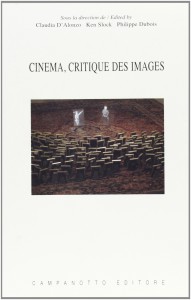Cinéma, critique des images
Sous la direction de Claudia D'Alonzo, Ken Slock et Philippe Dubois


Moyenne des votes : ![]()
| 0 | vote | |
| 0 | vote | |
| 0 | vote | |
| 0 | vote |
Votre vote : -
Description de l'ouvrage :
(Lectures in French and English.)
This second volume emphasizes on an angle of research seldom adressed in the previous volumes, which considers cinéma as a form or a critical tool applied to images. The point is to think cinéma as a shape of the mind rather than as an image, as a modality rather than as an object, as a way of seeing things rather than as a thing. And as such, this modality, demands to take a critical look on the world of images. In other words, the texts assembled here all present a gap, a distance, a form of detachment taken by cinema itself from the images it assembles or to which it refers. Here, Cinema should be looked at as a mean of looking, it “watches itself watching”, and this observative distance institutes it as a critical posture, often with a sharp conscience of its role and place, a conscience of its status and of its stakes, a conscience of its forms and of its critical tools’s strenght, a conscience that is self-reflexive, perfectly contemporary, synchronous with the distanciated world in which we are immerged and in which beliefs have disappeared to the benefit of conscience.
CINEMA, critique des images is the second of two selections of contributions to the III Paris Summerschool of Cinema and Contemporary Arts and the VII MAGIS - Gorizia International Film Studies Spring School.
Contributions from Emilio Audissino, Martin Barnier, Mauro Buzzi, Rossella Catanese, Alice Cati, Adam Chambers, Giacomo Coggiola, Valentina Cucca, Samuel De Jesus, Miriam De Rosa, Marc Delogne, Glenda Franchin, Evgenia Giannouri, Jakob Hesler, Junji Hori, Anne-Violaine Houcke, Stefano Jacoviello, Blandine Joret, Jorge La Ferla, Julie-Ann Latulippe, Mathias Lavin, Katerina Loukopoulou, Lawrence Thomas Martinelli, Nathalie Mary, Dennis Mathei, Cezar Migliorin, Julien Milly, Lu´cia Ramos Monteiro, Frédéric Monvoisin, Myriam Luisa Diaz Moyano, Massimo Olivero, Maria Do Carmo Piçarra, Alan Salvado, Ghada Sayegh, Raquel Schefer, Johannes Schmidt, Marco Senaldi, Marta Silvi, Francesca Veneziano, and Marc Vernet.
Edited by Claudia D’Alonzo and Ken Slock with an introduction by Philippe Dubois.
CLAUDIA D’ALONZO is a Ph.D. candidate in Audiovisual Studies at the University of Udine.
KEN SLOCK is a Ph.D. candidate in Audiovisual Studies at the University of Paris 3.
> Des mêmes auteurs :
Le Corps et la Machine (2016)
la pensée de l'image cinématographique chez Jean Epstein et Maurice Merleau
de Ken Slock
Sujet : Réalisateur > Jean Epstein
Extended cinema (2010)
Le cinéma gagne du terrain
Dir. Philippe Dubois, Frédéric Monvoisin et Elena Biserna
Sujet : Genre > Expérimental
Oui, c'est du cinéma (2009)
formes et espaces de l'image en mouvement
Dir. Philippe Dubois, Lúcia Ramos Monteiro et Alessandro Bordina
Sujet : Théorie
Cinéma et dernières technologies (1998)
Dir. Frank Beau, Philippe Dubois et Gérard Leblanc
Sujet : Technique > Toutes les techniques
Un chien andalou (1993)
lectures et relectures
de Philippe Dubois et Edouard Arnoldy
Sujet : Un Film > Un chien andalou
Les Voyages de Wim Wenders (1985)
de Catherine Petit, Philippe Dubois et Claudine Delvaux
Sujet : Réalisateur > Wim Wenders
> Sur un thème proche :
Où est passé le passé (2022)
Traces, archives, images
de Laurent Olivier et Jérôme Prieur
Sujet : Théorie
Théâtres de la mémoire (2011)
Mouvement des images
de Christa Blümlinger, Michèle Lagny, Sylvie Lindeperg et François Niney
Sujet : Théorie
Fondation Pathé (2024)
Fondation Jérôme Seydoux Pathé
Collectif
(en français, anglais et italien)
Sujet : Economie
Exploring Past Images in a Digital Age (2023)
Reinventing the Archive
Dir. Nezih Erdogan et Ebru Kayaalp
(en anglais)
Sujet : Economie
Créer, conserver, restaurer (2023)
40 ans de techniques audiovisuelles à l'INA
de Jean Varra
Sujet : Economie
La Cinémathèque-musée (2020)
une innovation cinéphile au cœur de la patrimonialisation du cinéma en France (1944-1968)
Sujet : Sociologie
Nota : Un livre sur fond de couleur beige est un livre édité dans une autre langue que le français.
(*) Les boutons « Acheter chez Amazon.fr », « Commander sur Fnac.com » & « Rakuten » sont des liens affiliés. Le gestionnaire de ce site reçoit une petite commission lorsque vous achetez un livre après avoir cliqué sur le bouton. Ces (petites) commissions sont les seuls revenus de ce site qui ne contient aucune publicité, aucune insertion (ou mise en avant) payante.